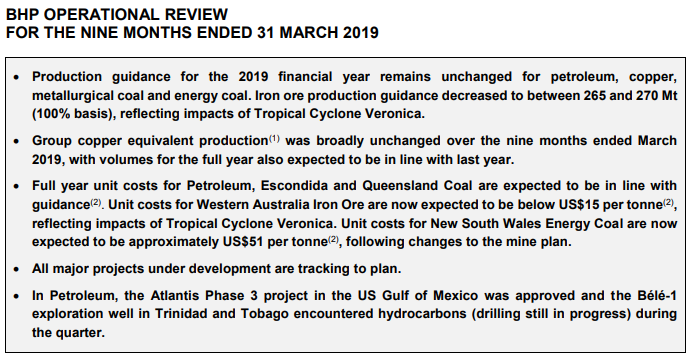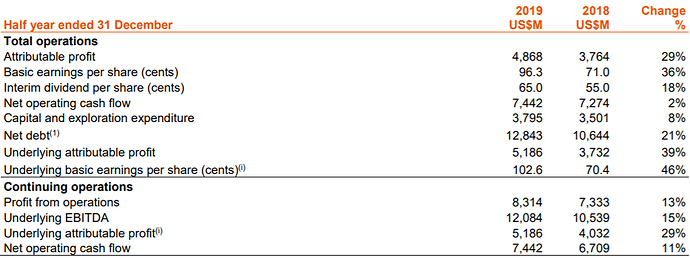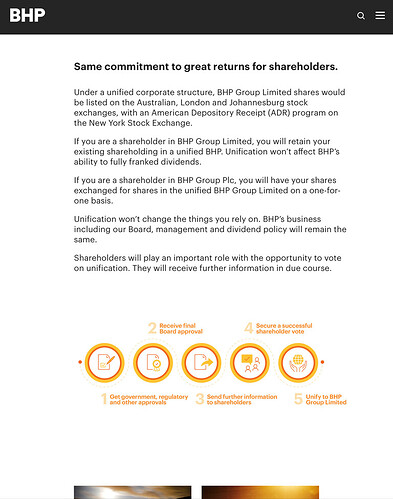BHP Billiton incrementa su interim dividend de 0.16$ a 0.40$ (+150%) recuperando parte del dividendo que recortó en la crisis de las materias primas.
Acojonante rally de las mineras, y mientras el precio de las materias primas acompañe puede quedar rally para rato.
Yo no llevo BHP, pero llevo en cartera Vale, Riotinto y mittal.
Un comentario para los que las tienen compradas en US como ADRs, 1 ADR son 2 acciones así que el dividendo es de 0.80$
Un saludo
Resultados al cierre del año fiscal:
- Beneficio neto: 5.890 millones de dólares (el año anterior pérdidas de 6.385 millones de dólares).
- Facturación: 38.285 millones de dólares (+23,8 %).
- Deuda neta: 16.321 millones de dólares (-37,5%).
Hoy ex-dividend de BHP.
El ADR 0,86$. Un 7% más que el anterior (0,8$)… ¡¡¡Eso es bastante más que la inflación!!!
Salu2
Results for year ended 30 June 2019 (20/08/2019)
- Attributable profit of US$8.3 billion includes an exceptional loss of US$818 million (2018: US$3.7 billion, which includes a US$5.2 billion exceptional loss). The 2019 financial year exceptional loss is related to the Samarco dam failure, partially offset by the reversal of provisions for global taxation matters which were resolved during the period.
- Underlying attributable profit of US$9.1 billion (2018: US$8.9 billion).
- Profit from operations (continuing operations) of US$16.1 billion (2018: US$16.0 billion) increased as a result of higher prices, lower depreciation and amortisation charges and the favourable impacts of exchange rate movements, offset by the impact from resource headwinds (copper grade decline, petroleum natural field decline and higher coal strip ratios), production outages, and adverse weather (including Tropical Cyclone Veronica).
- Underlying EBITDA (continuing operations) of US$23.2 billion (2018: US$23.2 billion), with higher prices and favourable exchange rate movements offset by higher costs (including outages), inflation, the impact of weather, and other net movements.
- Underlying EBITDA margin (continuing operations) of 53 per cent (2018: 55 per cent).
- Underlying return on capital employed of 16.1 per cent (2018: 14.4 per cent), or 18.0 per cent excluding Onshore US.
- Net operating cash flows (continuing operations) of US$17.4 billion (2018: US$17.6 billion) reflect strong commodity prices offset by increased costs and higher Australian and Chilean income tax payments in the 2019 financial year.
- Free cash flow (continuing operations) of US$10.0 billion, after investment of US$7.4 billion. Total free cash flow of US$20.5 billion, including US$10.4 billion of proceeds from the sale of Onshore US.
- Our balance sheet remains strong, with net debt at US$9.2 billion at 30 June 2019 (31 December 2018: US$9.9 billion; 30 June 2018: US$10.9 billion). The reduction of US$1.7 billion in net debt reflects strong free cash flow generation, including proceeds received from the sale of Onshore US, partially offset by record returns to shareholders of US$16.6 billion, dividends paid to non-controlling interests of US$1.2 billion and an unfavourable non-cash fair value adjustment of US$0.4 billion related to interest rate and exchange rate movements
BHP Results for the half year ended 31 December 2019 (18/02/2020)
Lo posteo aquí aunque es una nota de Morningstar sectorial más que especifica de esta compañía.
En esta compañía como en las demás del sector lo normal serían reducciones y cancelaciones de dividendo. De todas formas, comprándolas bien abajo y teniendo la paciencia de aguantarlas hasta que la economía se recupere, podrías hacerte con unos buenos YOC. Todo ello acompañado de los correspondirntes condicionales, presuntamente, etc…
Analyst Note | by Mathew Hodge Updated Mar 19, 2020
In response to the disruption in markets and the significant sell-off in equity prices, we now see the Australian and major global mining stocks we cover as being generally undervalued. Based on the prices at close on March 17, our coverage is nearly 20% undervalued on average. This compares with our last sector update in January when we saw our coverage as being about 10% overvalued on average, based on share prices from Jan. 15. The coal and base metals-focused miners are generally most undervalued. We still see overvaluation among the iron ore-exposed miners, namely Fortescue and Rio Tinto, given the iron ore price remains elevated.
The S&P/ASX 200 Resources index is down by just over one-third from the recent January 2020 highs. Given the shares of the miners have sold off so significantly and we’re now seeing value emerge, it’s important to consider the potential downside to our fair value estimates. Through the global financial crisis, weak balance sheets were a common cause for shareholder value destruction. And to this end we’ve reviewed the balance sheets of our global mining coverage.
At this point, we think the balance sheet risk does not warrant factoring in material shareholder value destruction and maintain our fair value estimates for the miners under our coverage. But we highlight the very high uncertainty ratings for the three most leveraged firms–Glencore, Teck Resources and Whitehaven. In general, the balance sheets are now in much better shape than in 2008 prior to the GFC, and relative to the most recent commodity price downturn in 2015/16. If anything, the 2015 downturn was positive for the industry as it prompted the miners to generally strengthen their balance sheets as a priority. The strong recovery in commodity prices from 2016 through to 2019 provided the miners with the cash flow to fortify their financial positions.
Las cíclicas haciendo de cíclicas. Anuncia dividendo record de 2$ ![]()
Relacionado:
“Los accionistas de BHP recibirán un pago en acciones de Woodside, lo que dará a los inversores de BHP una participación del 48% en el grupo fusionado”
¿Alguno sabe si esto aplica a las acciones independientemente de si son de LSE, NYSE o ASX?
Gracias
Ultimamente estan saliendo noticias sorprendentes sobre BHP. Una de ellas es la de Expansión que al ser de pago no he leído mas que el titular, BHP dejará de cotizar en la bolsa de Londres y lo hará solo en la de Australia. Sospecho que era un titular gancho dado que BHP cotiza en muchas otras bolsa y pienso que habrán mezclado el hecho de que BHP dejará de ser una empresa con doble sede en Inglaterra y Australia a solo Australia, algo similar a lo que ocurrió con Unilever pero al contrario; en este caso Unilever no dejó de cotizar en la bolsa de Amsterdam. ¿Sabéis algo mas sobre este tema?
Esto es lo que pone en la propia web de bhp.
https://www.bhp.com/our-businesses/unified-corporate-structure/
Yo entiendo que afirman que mantendrán cotización secundaria en Londres, Sudáfrica y Usa, una misma política de dividendos, iguales beneficios, y bla, bla, bla.
Pero en lo que afectaría para los dividendos, supongo que si pasa a ser una empresa australiana, las retenciones pasarían a ser las de Australia, pasando de un bonito 0% en origen a un no tan bonito 30%.
A ver cómo evoluciona el tema, pero para empezar, todos los fondos indexados al footsie, deberían salir pues ya no sería una empresa inglesa.
Por lo que veo en el mensaje que has puesto, el dividendo es “fully franked”. En las australianas significa que la retención es del 0%.
https://www.ato.gov.au/Forms/You-and-your-shares-2021/?anchor=dividendspaid#dividendspaid
Gracias. No conocía a los fully franked estos, pero si es así, será un placer conocerlos.
En principio, no me hace mucha gracia lo de estar en un mercado del que no se nada como el australiano, pero de todas formas esperaré a ver cómo funciona todo esto porque tampoco me hace ninguna gracia deshacer la posición.
Se está marcando hoy una caída bastante interesante… ¿Ha pasado algo y no me he enterado?
Hola, he encontrado esto Why is the BHP share price sinking 10% today? (fool.com.au). Espero haber pegado el enlace bien.
Mil gracias. Lo que no me ha quedado del todo claro es si solo que tienen de acciones listadas Australia tendrán las nuevas WDS, o también aplica a los que tienen acciones en Londres. Habrá que esperar.
Fuente oficial aqui ![]()
Imagino que debe afectar a las acciones británicas cuando han caido el 10%, lo que no se es como cuadra esto con Hacienda, ya que me ha parecido entender que las acciones salen de un dividendo extraordinario… Puede ser un jaleo a la hora de vender las originales y las generadas.


